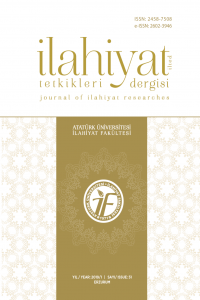Kastallânî’nin el-Mevâhibu’l-ledünniyye’sinin Bâkî Tercümesi: Meʿâlimü'l-yakîn -Tercüme ve Rivâyet Tercihi Yöntemi Açısından İncelenmesi-
Abstract
Müslümanlar, Hz. Peygamber'in (s.a.v.) hayatını
öğrenmek gayesiyle ilk zamanlardan itibaren gerekli çalışmaları yapmışlardır.
İslam'ı din olarak seçen Türkler de bu faaliyetlerin içine girmişler ve bu
çalışmaların bir kısmı da tercüme faaliyetleri şeklinde olmuştur. Osmanlı
Devleti'nin tartışmasız en parlak dönemi olan XVI. asır bu tür çalışmaların
artması yönüyle de önemlidir. Şairler sultanı olarak anılan Bâkî’nin,
Kastallânî’nin eseri Mevâhıbu’l-ledünniyyeyi tercümesi de bunlara güzel bir
örnektir. Bu eser onun şiirdeki üstatlığının yanında nesirdeki gücünü de
göstermektedir. Bâkî'nin bu tercümede tarihî rivâyetleri nasıl değerlendirdiği
konusu ile hadis metinlerinin tercüme ve tenkidinde izlediği yöntem hakkında
ise yeterli bilgi bulunmamaktadır. Bu çalışmada eserin özellikle ilk bölümleri
bu amaçla karşılaştırmalı olarak incelenmiştir. Yapılan bu tercümede, ilgili
eserdeki rivâyetlerin tenkit edilmesinden ziyade, Bâkî tarafından bazı
rivâyetler arasında tercihte bulunulduğu sonucuna varılmıştır. Çalışmada
Bâkî'nin tercümede takip ettiği metod ve rivâyetleri tercih ederken neleri
dikkate aldığı gibi hususlar üzerinde durulmuştur.
References
- Kur’an-ı Kerim Meâli. Haz. Halil Altuntaş-Muzaffer Şahin. Ankara: Diyanet İşleri Başkanlığı Yayınları, 2010.
- Abdülbâki. Mevâhibül'l-ledünniye tercümesi meʿâlimü'l-yaḳîn. İstanbul: Dârü't-tıbâati'l-âmire, 1313.
- Abdulfettâh Ebû Gudde. “Takdime”. el-Maṣnû’ fî ma’rifeti’l-hadîsi’l-mevżû’. Thk. Abdulfettâh Ebû Gudde. Beyrût: Dâru’l-beşâir, 1994.
- Abdülhay el-Kettânî. Fihrîsü’l-Fehâris. Beyrût: 1402/1982.
- Buhârî, Muhammed b. İsmail. el-Câmiʿu's-saḥîḥ. Thk. Mustafa Dîb el-Buğâ. Beyrût: Dâru İbn-i Kesîr, 1987/1407.
- Demircan, Adnan. Siyer. İstanbul: Beyan Yayınları, 2016.
- İbn Hişâm. es-Sîretü’n-nebeviyye. Thk. Mustafa es-Sekkâ - İbrâhim el-Ebyârî - Abdülhafîz eş-Şelebî. Kâhire: 1375/1955.
- İbn Saʿd. Ṭabaḳâtü'l-kübrâ. Nşr. İhsan Abbâs. Beyrût: Dâru sâdır, 1388/1968.
- Kastallânî, Ahmed b. Muhammed. el-Mevâhıbu’l-ledunniye bi’l-minaḥi’l-Muḥammediyye. Thk. Me'mûn b. Muhyiddîn el-Cennân. Beyrût: Dâru'l-kütübi'l-ılmiyye, 1996.
- Karatay, Fehmi Ethem. Arapça Yazmalar Kataloğu. İstanbul: Topkapı Sarayı Müzesi Yayınları, 1966, 3: 272-274.
- Kâtip Çelebi (Hâcı Halîfe). Keşfu’ẓ-ẓunûn an esâmi’l-kütübi ve’l-funûn. İstanbul: 1971.
- Kettânî, Abdülhay. Fihrisü’l-Fehâris. Beyrût: 1402/1982.
- Köprülü, M. Fuad. Divan Edebiyatı Antolojisi. Ankara: Akçağ Basım Yayım Pazarlama, 2006.
- Müslim, Ebu'l-Hüseyin b. Haccâc el-Kuşeyrî en-Nîsâbûrî. Saḥîḥu Müslim. Thk. Muhammed Fuâd Abdülbâki. Beyrût: Dâru'l-ihyâ-i türâsi'l-Arabiyyi, 1954.
- Öz, Şaban. İlk Siyer Kaynakları ve Müellifleri. İstanbul: 2008.
- Tergib, Orhan. Bâkî’nin Meâlimü’l-Yakîn Adlı Eseri Üzerinde Dil İncelemesi. Doktora Tezi. İstanbul Üniversitesi, 2010.
- Vâkidî. Kitâbu'l- Meġāẕî. Thk. Marsden Jonesc. Beyrût: Âlemü'l-kütüb, 1984/1403.
- Yazar, Sadık. Anadolu Sahası Klâsik Türk Edebiyatında Tercüme ve Şerh Geleneği. Doktora Tezi, İstanbul Üniversitesi, 2011.
- Zehebî, Muhammed b. Ahmed. Siyerü aʿlâmin-nübelâ. Thk. Beşşâr Avvâd Ma'rûf v.dğr. Beyrût: Müsessesetü'r-risâle, 1982/1402.
- ez-Zürkânî, Muhammed b. Abdilbâki. Şerhu'l-ʿallâmeti'l-Zürḳānî ale'l-mevâhıbi'l-ledünniyye. Tsh. Muhammed Abdu'l-azîz el-Hâlidî. Beyrût: Dâru'l-kütübi'l-ilmiyye, 1417/1996.
Bāqī’s Translation of al-Mawāhibu’l-ladunniyyah by Kastallānī: Maʿālimu’l-yaqīn- Research in Term of Translation and the Method of Narration Preference-
Abstract
In order to learn the life of the Prophet (s.a.v.), the Muslims have made necessary studies from the beginning. After they entered the Islamic religion, Turks have been involved in these activities and some of these activities have been translation studies. The 16th century, which is undisputedly the brightest period of the Ottoman Empire, is also important in this respect that the number of related studies have increased in this period. It is very important in this regard that Bāqī, who was considered the king of poets of the 16th century, translated Kastallānī's work Mawāhibu’l-ladunniyyah on Siyer. In addition to his mastery in the poem, he also shows his power in the prose as well as his account of Islamic sciences. Although some studies have been carried out on this work, especially in the field of literature, there are few studies about what he takes into attention to in translation. In particular, there is not enough information about the interpretation of the historical narrations or the translation and criticism of the hadith texts. Particularly the first parts of the work have been examined comparatively for this purpose and it is concluded that Bâqî has made selections among the narrations. In this study, what Bāqī took into consideration while selecting the methods and narrations that he followed in the translation was emphasized.
Keywords
References
- Kur’an-ı Kerim Meâli. Haz. Halil Altuntaş-Muzaffer Şahin. Ankara: Diyanet İşleri Başkanlığı Yayınları, 2010.
- Abdülbâki. Mevâhibül'l-ledünniye tercümesi meʿâlimü'l-yaḳîn. İstanbul: Dârü't-tıbâati'l-âmire, 1313.
- Abdulfettâh Ebû Gudde. “Takdime”. el-Maṣnû’ fî ma’rifeti’l-hadîsi’l-mevżû’. Thk. Abdulfettâh Ebû Gudde. Beyrût: Dâru’l-beşâir, 1994.
- Abdülhay el-Kettânî. Fihrîsü’l-Fehâris. Beyrût: 1402/1982.
- Buhârî, Muhammed b. İsmail. el-Câmiʿu's-saḥîḥ. Thk. Mustafa Dîb el-Buğâ. Beyrût: Dâru İbn-i Kesîr, 1987/1407.
- Demircan, Adnan. Siyer. İstanbul: Beyan Yayınları, 2016.
- İbn Hişâm. es-Sîretü’n-nebeviyye. Thk. Mustafa es-Sekkâ - İbrâhim el-Ebyârî - Abdülhafîz eş-Şelebî. Kâhire: 1375/1955.
- İbn Saʿd. Ṭabaḳâtü'l-kübrâ. Nşr. İhsan Abbâs. Beyrût: Dâru sâdır, 1388/1968.
- Kastallânî, Ahmed b. Muhammed. el-Mevâhıbu’l-ledunniye bi’l-minaḥi’l-Muḥammediyye. Thk. Me'mûn b. Muhyiddîn el-Cennân. Beyrût: Dâru'l-kütübi'l-ılmiyye, 1996.
- Karatay, Fehmi Ethem. Arapça Yazmalar Kataloğu. İstanbul: Topkapı Sarayı Müzesi Yayınları, 1966, 3: 272-274.
- Kâtip Çelebi (Hâcı Halîfe). Keşfu’ẓ-ẓunûn an esâmi’l-kütübi ve’l-funûn. İstanbul: 1971.
- Kettânî, Abdülhay. Fihrisü’l-Fehâris. Beyrût: 1402/1982.
- Köprülü, M. Fuad. Divan Edebiyatı Antolojisi. Ankara: Akçağ Basım Yayım Pazarlama, 2006.
- Müslim, Ebu'l-Hüseyin b. Haccâc el-Kuşeyrî en-Nîsâbûrî. Saḥîḥu Müslim. Thk. Muhammed Fuâd Abdülbâki. Beyrût: Dâru'l-ihyâ-i türâsi'l-Arabiyyi, 1954.
- Öz, Şaban. İlk Siyer Kaynakları ve Müellifleri. İstanbul: 2008.
- Tergib, Orhan. Bâkî’nin Meâlimü’l-Yakîn Adlı Eseri Üzerinde Dil İncelemesi. Doktora Tezi. İstanbul Üniversitesi, 2010.
- Vâkidî. Kitâbu'l- Meġāẕî. Thk. Marsden Jonesc. Beyrût: Âlemü'l-kütüb, 1984/1403.
- Yazar, Sadık. Anadolu Sahası Klâsik Türk Edebiyatında Tercüme ve Şerh Geleneği. Doktora Tezi, İstanbul Üniversitesi, 2011.
- Zehebî, Muhammed b. Ahmed. Siyerü aʿlâmin-nübelâ. Thk. Beşşâr Avvâd Ma'rûf v.dğr. Beyrût: Müsessesetü'r-risâle, 1982/1402.
- ez-Zürkânî, Muhammed b. Abdilbâki. Şerhu'l-ʿallâmeti'l-Zürḳānî ale'l-mevâhıbi'l-ledünniyye. Tsh. Muhammed Abdu'l-azîz el-Hâlidî. Beyrût: Dâru'l-kütübi'l-ilmiyye, 1417/1996.
Details
| Primary Language | Turkish |
|---|---|
| Subjects | Religious Studies |
| Journal Section | Research Articles |
| Authors | |
| Publication Date | June 30, 2019 |
| Submission Date | February 12, 2019 |
| Published in Issue | Year 2019 Issue: 51 |
Cite
Journal of Ilahiyat Researches is licensed under a Creative Commons Attribution-NonCommercial-NoDerivatives 4.0 International License.


